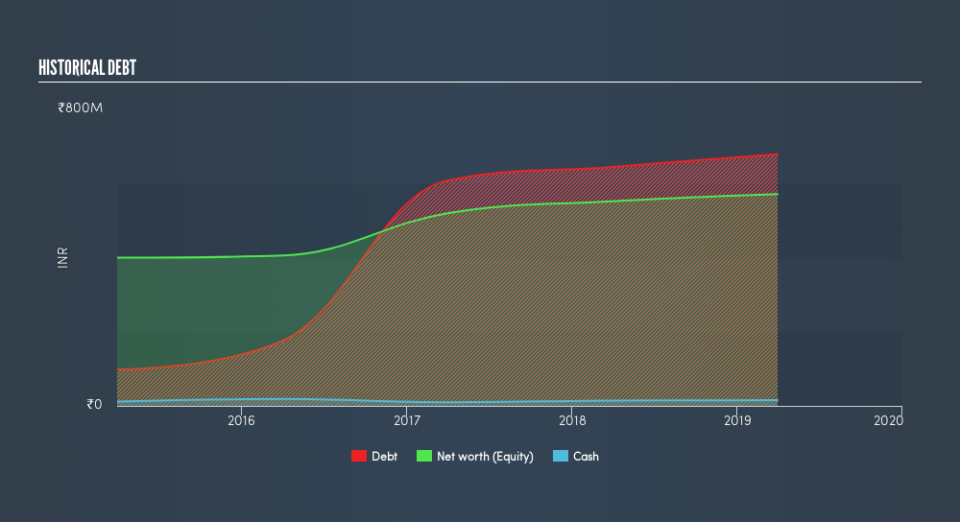Does Pansari Developers (NSE:PANSARI) Have A Healthy Balance Sheet?

Warren Buffett famously said, 'Volatility is far from synonymous with risk.' It's only natural to consider a company's balance sheet when you examine how risky it is, since debt is often involved when a business collapses. We can see that Pansari Developers Limited (NSE:PANSARI) does use debt in its business. But should shareholders be worried about its use of debt?
Why Does Debt Bring Risk?
Generally speaking, debt only becomes a real problem when a company can't easily pay it off, either by raising capital or with its own cash flow. If things get really bad, the lenders can take control of the business. However, a more usual (but still expensive) situation is where a company must dilute shareholders at a cheap share price simply to get debt under control. Of course, debt can be an important tool in businesses, particularly capital heavy businesses. When we think about a company's use of debt, we first look at cash and debt together.
View our latest analysis for Pansari Developers
How Much Debt Does Pansari Developers Carry?
The image below, which you can click on for greater detail, shows that at March 2019 Pansari Developers had debt of ₹679.0m, up from ₹644.9m in one year. However, because it has a cash reserve of ₹15.3m, its net debt is less, at about ₹663.7m.
How Strong Is Pansari Developers's Balance Sheet?
Zooming in on the latest balance sheet data, we can see that Pansari Developers had liabilities of ₹1.30b due within 12 months and liabilities of ₹362.3m due beyond that. Offsetting this, it had ₹15.3m in cash and ₹68.3m in receivables that were due within 12 months. So its liabilities outweigh the sum of its cash and (near-term) receivables by ₹1.58b.
This deficit casts a shadow over the ₹397.8m company, like a colossus towering over mere mortals. So we'd watch its balance sheet closely, without a doubt At the end of the day, Pansari Developers would probably need a major re-capitalization if its creditors were to demand repayment.
We measure a company's debt load relative to its earnings power by looking at its net debt divided by its earnings before interest, tax, depreciation, and amortization (EBITDA) and by calculating how easily its earnings before interest and tax (EBIT) cover its interest expense (interest cover). This way, we consider both the absolute quantum of the debt, as well as the interest rates paid on it.
Weak interest cover of 2.2 times and a disturbingly high net debt to EBITDA ratio of 12.9 hit our confidence in Pansari Developers like a one-two punch to the gut. This means we'd consider it to have a heavy debt load. Another concern for investors might be that Pansari Developers's EBIT fell 10% in the last year. If things keep going like that, handling the debt will about as easy as bundling an angry house cat into its travel box. The balance sheet is clearly the area to focus on when you are analysing debt. But it is Pansari Developers's earnings that will influence how the balance sheet holds up in the future. So if you're keen to discover more about its earnings, it might be worth checking out this graph of its long term earnings trend.
But our final consideration is also important, because a company cannot pay debt with paper profits; it needs cold hard cash. So it's worth checking how much of that EBIT is backed by free cash flow. Over the last three years, Pansari Developers saw substantial negative free cash flow, in total. While that may be a result of expenditure for growth, it does make the debt far more risky.
Our View
To be frank both Pansari Developers's conversion of EBIT to free cash flow and its track record of staying on top of its total liabilities make us rather uncomfortable with its debt levels. And even its interest cover fails to inspire much confidence. We think the chances that Pansari Developers has too much debt a very significant. To our minds, that means the stock is rather high risk, and probably one to avoid; but to each their own (investing) style. Over time, share prices tend to follow earnings per share, so if you're interested in Pansari Developers, you may well want to click here to check an interactive graph of its earnings per share history.
When all is said and done, sometimes its easier to focus on companies that don't even need debt. Readers can access a list of growth stocks with zero net debt 100% free, right now.
We aim to bring you long-term focused research analysis driven by fundamental data. Note that our analysis may not factor in the latest price-sensitive company announcements or qualitative material.
If you spot an error that warrants correction, please contact the editor at editorial-team@simplywallst.com. This article by Simply Wall St is general in nature. It does not constitute a recommendation to buy or sell any stock, and does not take account of your objectives, or your financial situation. Simply Wall St has no position in the stocks mentioned. Thank you for reading.

